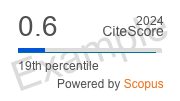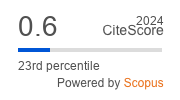THE IMPACT OF NON-PHARMACOLOGICAL REHABILITATION ON THE PERFORMANCE OF THE CLINICAL AND LABORATORY STATUS OF PATIENTS WITH IRRITABLE BOWEL SYNDROME
https://doi.org/10.29001/2073-8552-2018-33-2-64-69
Abstract
Irritable bowel syndrome belongs to the category of heavy, hard to treat diseases, which often lead to disability, therefore, the relevance of the restoration of the functional activity of the intestine is not in doubt. We carried out an evaluation of the results of sanatorium-resort treatment of 135 patients with different types of Irritable bowel syndrome (constipation, diarrhea). Age of patients ranged from 18 to 40 years, disease duration from 6 months to 5 years. High effectiveness of complex rehabilitation program in the form of recourse or relief of patient complaints, laboratory remission of the disease and stabilization of the psychological state of patients was proved. It is shown that application in complex rehabilitation of patients of Irritable bowel syndrome amplipuls therapy and millimeter therapy, contributes to more evident improvement in indices of nonspecific resistance and adaptive capacity of the organism, normalization of the intestine’s microflora, and hence increase of the colon the immune protection.
About the Authors
N. I. PrivalovаRussian Federation
Privalova Natalya I. - Postgraduate Student of the Department of Hospital Therapy with the Course of Rehabilitation, Physiotherapy and Sports Medicine.
2, Moskovsky tract, Tomsk, 634050
O. A. Poddubnaya
Russian Federation
Poddubnaya Olga A. - Dr. Sci. (Med.), Professor of the Department of Hospital Therapy with the Course of Rehabilitation, Physiotherapy and Sports Medicine.
2, Moskovsky tract, Tomsk, 634050; 4, Mira str., CATU Seversk, Tomsk region, 636070
References
1. Ivashkin V. T., Shelygin Y. A., Baranskaya E. K. et al. Clinical guidelines of the Russian gastroenterological Association, the association of Russian coloproctologists in the diagnosis and treatment of patients with irritable bowel syndrome. Ros. jurn. gastroenterol. gepatol. koloproktol. = The Russian Journal of Gastroenterology, Hepatology, Coloproctology. 2014; 2: 92–101. (In Russ).
2. Poluektova E. A., Kuchumova S. Yu., Shifrin O. S., Sheptulin A. A., Ivashkin V. T. Pathogenic role of intestinal microflora changes in patients with irritable bowel syndrome and the ways of its correction. Ros. jurn. Gastroenterol., gepatol., koloproktol. = The Russian Journal of Gastroenterology, Hepatology, Coloproctology. 2014; 3: 89–96. (In Russ).
3. Danilov D. S., Morozov D. V., Korobkova I. G., Luk’yanova T. V. Irritable bowel Syndrome in the practice of a psychiatrist (the problem of the nosological independence) and the possibility of its treatment with antidepressants (for example, the effectiveness of paroxetine). Nevrologiya, neiropsihiatriya, psihosomatika = Neurology, neuropsychiatry, psychosomatics. 2013; 2: 46–50. DOI: 10.14412/2074-2711-2013-2413. (In Russ).
4. Netrebenko O. K., Ukraintsev S. E. Infant colic and irritable bowel syndrome: common sources or sequential transition? Pediatriya = Pediatrics. 2018; 97(2): 193–199. (In Russ).
5. Filippova O. L., Statsenko E. V., Bikbavova G. R., Labuzina N. S., Sazonova E. I. Irritable bowel syndrome. Possibilities of physiotherapy. Sanatorno-kurortnie organizacii: menedjment, marketing, ekonomika, finansi = Sanatorium and resort organizations: management, marketing, economics, finance. 2015; 4: 68–73. (In Russ).
6. Gusakova E. V. Physical factors in the treatment of patients with irritable bowel syndrome. Fizioterapevt = Physiotherapist. 2005; 12: 4–9. (In Russ).
7. Razumov A. N., Bobrovnitsky I. P. Rehabilitation medicine: 15 years of recent history — the stages and directions of development. Vestnik vosstanovitelnoi medicine = Bulletin of regenerative medicine. 2008; 3: 7–13. (In Russ).
8. Schegolev S. F., Poddubnaya O. A., Beloborodova E. I., Rentina S. D. Magnetotherapy in the complex treatment of patients with chronic opisthorchiasis. Byulleten sibirskoi medicine = Bulletin of Siberian medicine. 2009; 3: 121–127. (In Russ).
9. Lukomsky I. V., Sikorska S. I., Ulashchik V. S. Physiotherapy. Therapeutic exercise. Massage. Minsk: Visa school; 2010: 384. (In Russ).
10. Chij A. G., Osadchuk M. A., Islamova E. A. The effectiveness of laser therapy in the treatment of patients with irritable bowel syndrome. Uspehi sovremennogo estestvoznaniya = Success of modern natural science. 2003; 10: 106. (In Russ).
11. Vigodner E. B. Physical factors in gastroenterology. Moscow: Medicina, 1987: 304. (In Russ).
12. Nikitin I. G., Baikova I. E., Gogova L. M., Volynkina V. M., Sarkisyan K. N. Irritable bowel syndrome: clinical and diagnostic features. RMJ = RMJ. 2016; 26: 1805–1810. (In Russ).
13. Teppone M. Extremely high frequency (EHF) puncture. Moscow: Logos; 1997: 310. (In Russ).
14. Maev I. V. Cheremushkin S. V. Irritable bowel syndrome. Moscow: Forte-print; 2012: 52. (In Russ.)
15. Rapoport S. I., Frolov V. A., Hetegurov L. G. Chronobiology and chronomedicine. Moscow: Medicinskoe informacionnoe agentstvo; 2012: 72. (In Russ).
16. Ordinskaya T. A., Poruchikov P. V., Ordinskii V. F. Wave therapy. Moscow: Eksmo; 2008; 12: 496. (In Russ).
17. Razumov A. N., Oranskii I. E. Natural curative factors and biological rhythms in rehabilitation medicine. Moscow: Medicina: 2004: 296. (In Russ).
18. Lang T. A., Sesik M. How to report statistics in medicine. A guide for authors, editors and reviewers / transl. from Eng. edited by Leonov V. P. Moscow: Prakticheskaya Medicina; 2011: 480. (In Russ).
19. Garkavi L. H. Kvakina E. B. Kuzmenko T. S. Antistress reactions and activation therapy. Moscow: Imedis; 1998: 28. (In Russ).
Review
For citations:
Privalovа N.I., Poddubnaya O.A. THE IMPACT OF NON-PHARMACOLOGICAL REHABILITATION ON THE PERFORMANCE OF THE CLINICAL AND LABORATORY STATUS OF PATIENTS WITH IRRITABLE BOWEL SYNDROME. Siberian Journal of Clinical and Experimental Medicine. 2018;33(2):64-69. (In Russ.) https://doi.org/10.29001/2073-8552-2018-33-2-64-69




.png)





























